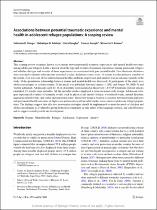| dc.description.abstract | This scoping review examines known associations between potential traumatic experiences and mental health outcomes
among adolescent refugees. Little is known about the type and severity of traumatic experiences among adolescent refugees
and whether the type and severity of these experiences are associated with poor mental health. Five electronic databases
were searched to identify relevant peer-reviewed articles. Inclusion criteria were: 1) trauma was the predictor variable of
the article, 2) at least one of two selected mental health conditions (depression and anxiety) was an outcome variable of the
study, 3) the quantitative relationship between trauma and mental health was discussed; 4) participants of the study were
adolescent refugees or asylum seekers; 5) the article was published between January 1, 2011 and August 30, 2020; 6) and
written in English. Adolescents aged 12–18 of all genders were included in this review. Of 3319 potentially relevant articles
identified, 11 articles were included. All the included studies employed a cross-sectional study design. Adolescent refugees
experienced a variety of traumatic events, such as physical and sexual violence, war-related events, natural disasters,
migration-related events, and verbal and emotional abuse. The review found a positive association between trauma exposure
and poor mental health outcomes of depression and anxiety in all included studies across diverse adolescent refugee populations.
The findings suggest that effective intervention strategies should be implemented to meet the needs of children and
adolescent refugees as a vulnerable group in the host community as they adjust to the language, cultural, and school barriers
and to support overall growth and development. | en_US |

